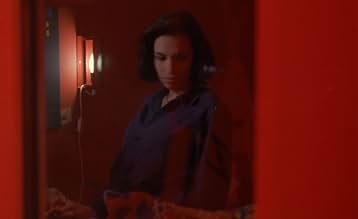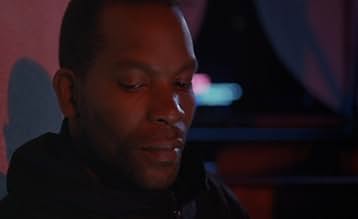IMDb RATING
6.8/10
1.5K
YOUR RATING
A serial killer terrorizes Paris at night, but that doesn't stop Daïga and Théo from meeting up, and falling in love.A serial killer terrorizes Paris at night, but that doesn't stop Daïga and Théo from meeting up, and falling in love.A serial killer terrorizes Paris at night, but that doesn't stop Daïga and Théo from meeting up, and falling in love.
- Director
- Writers
- Stars
- Awards
- 3 nominations total
Yekaterina Golubeva
- Daiga
- (as Katerina Golubeva)
Danièle Van Bercheycke
- Fleur
- (as Danielle van Bercheycke)
- Director
- Writers
- All cast & crew
- Production, box office & more at IMDbPro
Featured reviews
I can sort of see what (co)writer - director Claire Denis was trying to do here: a serial killer "thriller" minus any of the Hollywood flash, cross-pollinated with a "slice-of-Parisian-life" type of film (there is also a bit of "Pulp Fiction" going on, not in the chronology of events which is straightforward but in the way various characters pop in and out of each others' stories; however, because both films came out at the same year (1994), it's hard to say if there was any actual influence). Unfortunately, the result is boring, meandering and interminable. The Lithuanian girl's sections are marginally more interesting than the rest, mostly because Yekaterina Golubeva is stunningly beautiful. Gotta love that totally inaccurate IMDb plot description! * out of 4.
10cesar-52
You might have to be a foreigner to understand the plight of not belonging to the main culture of a country. The characters portrayed are deracine from their native countries, attracted by the promised land of capitalism, functioning mainly in the twilight hours of Paris, where they are mainly prey for sexual predators. Exploitation of these immigrants continue as it was in colonial times, except this time is not so overt. The illusion of freedom is thin. The impossibility of communication thick. Interacial affairs doomed, as are their children. Pretty bleak, but portrayed with sensitivity by Denis who shows us the underside and post effects of colonialism in contemporary Paris.
A movie genre that I've occasionally seen focuses on the gritty underbelly of supposedly idealistic places. Claire Denis's "J'ai pas sommeil" ("I Can't Sleep" in English) is one such movie. The protagonists are a group of in a dismal section of Paris who find each other amid a murder spree. This group includes a man from Martinique (a reminder of France's colonial history) and a woman from Lithuania (one of the many people who saw no prospects in their countries once the Eastern Bloc collapsed).
Quite a different image of France than we're used to, but this group of people still has it better than most people in the global south. The point is that millions if not billions of people worldwide live in these conditions. The people depicted in this movie could just as easily be people from Latin America seeking a better life in the US.
Basically, if you're reading this, then you're one of the privileged few. Definitely check out the movie.
Quite a different image of France than we're used to, but this group of people still has it better than most people in the global south. The point is that millions if not billions of people worldwide live in these conditions. The people depicted in this movie could just as easily be people from Latin America seeking a better life in the US.
Basically, if you're reading this, then you're one of the privileged few. Definitely check out the movie.
10lwong
"I Can't Sleep" opens with a shot of policemen laughing in a helicopter above Paris, a scene Denis says has no narrative function. The helicopter doesn't blow up or crash (as we half-expect, so Hollywood-trained we have become). We never learn why they are laughing, and it never comes up. but it immediately sets a tone of ordinariness about something that is so freighted with allusion - that police work is all dark violence and angst and frayed tension. Police work also includes ordinary moments between two people.
"I Can't Sleep" follows three sets of characters who come to be loosely linked. First is Daïga (Katerina Golubeva, an unknown with an exotic resemblance to Michelle Pfeiffer) who drives away from Lithuania and into the Paris ring in her boxy, smoking car. She has only vague ideas about what she wants other than to let Paris wash over her life. for the time being, she finds a tenuous niche in the émigré community working indifferently as a maid in a second rate hotel. Among the hotel's residents is Camille (another unknown, Richard Courcet as a drag hoodlum with a brooding boredom) who, with his friends and lovers, leads us through the gay subculture. And there is Theo, Camille's good brother who struggles the struggle of the unFrench emigrant class in neoconservative France. As we stay with these characters, we see a Paris that isn't a backdrop to romantic comedies like "Forget Paris" or "French Kiss." In the course of "I Can't Sleep" we get a sense of the shape of some of the other kinds of lives that are lived in Paris. We begin to move to the film's rhythm. At intervals are arresting set pieces that attenuate reaction. These subtle departures don't break the film's basic form, but they do break the mood of the expected. We get to laugh and be aware that we are laughing. We marvel at small things and know we are marvelling at them.
In "I Can't Sleep," newspaper headlines scream about a sociopath who is going around murdering and robbing solitary old women (based on a true case). Denis illustrates for us what we know to be true - that mostly people are unaffected. Everyone's lives continue to be lived routinely, each with their own personal life traumas that fill their days. By chance, the murders intersect our characters' lives and we see their reactions to it. There aren't any obvious cues for us. We watch Daïga as she learns who the murderer is. What she does and what happens as a result is less important than the almost wordless scene they share when she follows him. Something essential passes between them, but what that is is up to you. It's as much based on the experience you can bring to it and what abstractions you can add to the moment. Likewise, Theo's face is a dispassionate mask - it begs us on to project our reactions to his life circumstances.
This is a tenuous connection, a lot for Denis to ask of her audience, and it may not engage many or even most of those sitting out there. In a way, you have to have a ready state of mind to watch it. It reminds me most of Kryzysztof Kieslowski's "Red" and the conversations I had about it. More than a few friends said they couldn't suspend their qualms about the believability of the relationship between Jean-Louis Trintignant's character and Irene Jacob's. It was too far from convention (age difference) and lacked a believable basis (he was just a weird old guy, and what did they share anyway?). But for me, I loved it because his character seemed the tragic sum of all the characters I have seen Trintignant play (especially in "A Man and A Woman," "Z," "The Conformist" among others). Here was the same good man, now ruined at an advanced age, and I was meeting him again. I felt I understood him fundamentally, knew what he had gone through to reach this sour moment in his life and because of this, it was easy for me to project my understanding onto Jacob's character. I thought, "Of course she loves him."
Anyway, "I Can't Sleep" is, at its best moments, a collage of sometime odd elements that is somehow perfectly composed (like in "Paris, Texas" and "Wings of Desire," and in Kieslowski, especially, "Red" and some of the Dekalog episodes like "Thou shalt not bear false witness"). One can't explain why it seems right, but everyting certainly does feel just right - the film is conjured from single notes that together comprise a whole score. There is what seems like extraneous stuff in there. You wonder how it fits, what it really means. Yet, it nevertheless feels right once the whole has been digested.
"I Can't Sleep" follows three sets of characters who come to be loosely linked. First is Daïga (Katerina Golubeva, an unknown with an exotic resemblance to Michelle Pfeiffer) who drives away from Lithuania and into the Paris ring in her boxy, smoking car. She has only vague ideas about what she wants other than to let Paris wash over her life. for the time being, she finds a tenuous niche in the émigré community working indifferently as a maid in a second rate hotel. Among the hotel's residents is Camille (another unknown, Richard Courcet as a drag hoodlum with a brooding boredom) who, with his friends and lovers, leads us through the gay subculture. And there is Theo, Camille's good brother who struggles the struggle of the unFrench emigrant class in neoconservative France. As we stay with these characters, we see a Paris that isn't a backdrop to romantic comedies like "Forget Paris" or "French Kiss." In the course of "I Can't Sleep" we get a sense of the shape of some of the other kinds of lives that are lived in Paris. We begin to move to the film's rhythm. At intervals are arresting set pieces that attenuate reaction. These subtle departures don't break the film's basic form, but they do break the mood of the expected. We get to laugh and be aware that we are laughing. We marvel at small things and know we are marvelling at them.
In "I Can't Sleep," newspaper headlines scream about a sociopath who is going around murdering and robbing solitary old women (based on a true case). Denis illustrates for us what we know to be true - that mostly people are unaffected. Everyone's lives continue to be lived routinely, each with their own personal life traumas that fill their days. By chance, the murders intersect our characters' lives and we see their reactions to it. There aren't any obvious cues for us. We watch Daïga as she learns who the murderer is. What she does and what happens as a result is less important than the almost wordless scene they share when she follows him. Something essential passes between them, but what that is is up to you. It's as much based on the experience you can bring to it and what abstractions you can add to the moment. Likewise, Theo's face is a dispassionate mask - it begs us on to project our reactions to his life circumstances.
This is a tenuous connection, a lot for Denis to ask of her audience, and it may not engage many or even most of those sitting out there. In a way, you have to have a ready state of mind to watch it. It reminds me most of Kryzysztof Kieslowski's "Red" and the conversations I had about it. More than a few friends said they couldn't suspend their qualms about the believability of the relationship between Jean-Louis Trintignant's character and Irene Jacob's. It was too far from convention (age difference) and lacked a believable basis (he was just a weird old guy, and what did they share anyway?). But for me, I loved it because his character seemed the tragic sum of all the characters I have seen Trintignant play (especially in "A Man and A Woman," "Z," "The Conformist" among others). Here was the same good man, now ruined at an advanced age, and I was meeting him again. I felt I understood him fundamentally, knew what he had gone through to reach this sour moment in his life and because of this, it was easy for me to project my understanding onto Jacob's character. I thought, "Of course she loves him."
Anyway, "I Can't Sleep" is, at its best moments, a collage of sometime odd elements that is somehow perfectly composed (like in "Paris, Texas" and "Wings of Desire," and in Kieslowski, especially, "Red" and some of the Dekalog episodes like "Thou shalt not bear false witness"). One can't explain why it seems right, but everyting certainly does feel just right - the film is conjured from single notes that together comprise a whole score. There is what seems like extraneous stuff in there. You wonder how it fits, what it really means. Yet, it nevertheless feels right once the whole has been digested.
Writer-Director Claire Denis is telling a pretty strange tale in her "J'ai pas sommeil." Reportedly inspired by real-life news events, the focus is on an unsavory series of murders in a large French city, and various people somehow related to these happenings. These folks do not all know one another or even, in some cases, come in contact with each other. More strangely, Denis incorporates a few people who don't seem to be related to the events at all. The film's structure is free form, and various scenes are deliberately presented in a disjunct manner. There is some interest generated in trying to figure out what's going on, and in fact, there are a couple of coldly frightening scenes of calculated murder. I found myself not being attracted to nor empathizing with any of these characters. I merely observed with some interest. The general viewer response will depend on personal preferences. All in all, I found this ultimately to be a very slightly above average film work.
Did you know
- TriviaAll entries contain spoilers
- ConnectionsReferences Le costaud des Épinettes (1923)
- How long is I Can't Sleep?Powered by Alexa
Details
Box office
- Gross US & Canada
- $111,015
Contribute to this page
Suggest an edit or add missing content





























